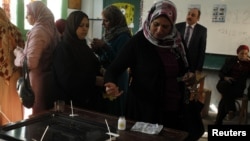Long lines of people formed outside polling stations in the Egyptian capital Cairo Saturday, as voting got under way on a referendum for a controversial new constitution. The vote is being staggered over two successive Saturdays due to a boycott by a majority of the judiciary, which must oversee the vote by law.
A crowd of women sang Egypt's national anthem as they stood in line to vote in Central Cairo Saturday. Men and women voted separately at schools across the capital and 9 other provinces to express approval or disapproval of the new constitution.
Egypt's top opposition leaders, including Mohamed ElBaradei, who heads the National Salvation Front, urged supporters to vote "no." Islamist groups, including the Muslim Brotherhood and the Salafist "Nour" Party called on their partisans to vote "yes."
Egypt's top opposition leaders, including Mohamed ElBaradei, who heads the National Salvation Front, urged supporters to vote "no." Islamist groups, including the Muslim Brotherhood and the Salafist "Nour" Party called on their partisans to vote "yes."
Egyptian President Mohamed Morsi, who refused to postpone the referendum despite pleas from opposition leaders and much of the judiciary, was shown on state TV casting his ballot near the presidential palace. Morsi was surrounded by a large number of bodyguards.
Clashes erupt
Clashes erupt
Supporters and opponents of the controversial constitution clashed just hours before polls opened in the Egyptian port city of Alexandria. Amateur video showed crowds of young men throwing rocks and firecrackers at each other near the city's Qaid Ibrahim mosque.
The governor of Alexandria, Hassan Prinz, deplored the violence and urged voters to express their opinions at the ballot box. Prinz said that every citizen has the right to vote yes or no and we must let the ballot box determine the future of the country, since this is democracy and we must accept it.
Former Arab League head and unsuccessful presidential candidate Amr Moussa was a bit more critical of the democratic process and its potential results. Moussa said that the opposition did not contest the election of President Mohamed Morsi, but that a constitution is different, because it should be accepted by a large majority of the people to be legitimate.
Divided opinion
Divided opinion
Many Arab analysts point to the fact that Egyptian public opinion is extremely polarized over the controversial constitution, which was approved by a rump committee made up of mostly Islamist members, in a marathon overnight session, 15 days ago.
Egypt's Draft Constitution
Egypt's Draft Constitution- Limits president to two four-year terms
- Provides protections against arbitrary detention and torture
- Islamic law, or Sharia, serves as the basis for legislation
- Religious freedom is limited to Muslims, Christians and Jews
- Citizens are deemed equal before the law and equal in rights
Omar, a virologist, supports the document, because he thinks that it will give Egypt some much needed stability. Omar said that he is in favor of holding the referendum, although he has some reservations about the constitution per se. Omar said that he thinks the vote creates movement in the political process at a time when it is not a good idea to make the transition period longer.
Voting officials extended the election by two hours Saturday because of heavy voter turnout.
The voting has been split into two rounds over two Saturdays, each round covering different regions of the country.
Voters in 14 Egyptian provinces are due to vote next Saturday. It was not immediately clear when final results would be announced.




